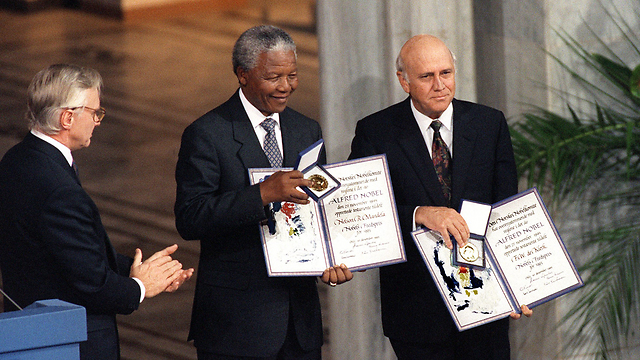Op-ed: True leadership requires that politics be put aside for a greater good; Netanyahu knows it, but isn’t prepared to make personal sacrafices.
What motivated former Prime Minister Yitzhak Rabin? Why didn’t he build up his image as the commander of the Six-Day War? As the knight of the “Promised Land?” What was the connection between his unusual moves and the accelerated economic development during his term? What was his goal? What was his national social perception? And did he succeed in implementing it before his life was cut short in the middle of the way?
In order to understand Rabin’s social perception, we should try to understand Willem de Klerk, South Africa’s president in the 1990s.
De Klerk was the person who handed over the rule of South Africa to Nelson Mandela, and together they brokered the end of apartheid in 1994 in a stagnated and extremely violent country which was ruled by the white minority and led a brutal oppression of the black inhabitants who were deprived of any elementary civil right, including the right to vote.
Many commentaries have been written about De Klerk’s brave move, after he gave up the natural aspiration of every leader – to remain in power.

The acceptable rationale of de Klerk’s move is in the field of foreign policy. In other words, the international pressure on the apartheid regime did the trick, perhaps similar to what BDS supporters are hoping to achieve by pressing Israel.
But a thorough and more accurate review reveals that the economic and diplomatic pressures were only part of de Klerk’s considerations. The real decisive consideration was in a more elusive and human field: The image of the South African society.
De Klerk saw the racism shattering the entire South African society, and the “white” society in particular, the enclaves of violence and rot that had spread, and the hatred of both white people and black people. He knew that if he failed to act, South Africa would start dying and that would lead to a bloodbath.
De Klerk’s moves show that his top priority was the image of society and the shaping image of people in Africa. The fact that every white child who is born is educated to hate, and that becomes the essence which infiltrates every single place.
Rabin, like de Klerk, understood the importance of the army, diplomacy, integration and narrowing social gaps, a growing and developing industry and the rule of law – but all these were just means for the really important thing: The creation of a better society, the existence of a person whose personal development is harmonious with the community and environment – and not against or at the expense of others.
It turns out that true leadership requires a social and refined outlook and a willingness to forsake conjunctural political considerations in order to achieve goals.
And Benjamin Netanyahu? He knows that too! Moreover, Netanyahu is endowed with wisdom and an understanding of processes, and his national social perception – on the macro level – is likely not far from de Klerk and Rabin’s perceptions.
These two leaders knowingly pursued the establishment of a developed democratic culture in order to offer the societies they were put in charge the best options offered by progress.
It was clear to both of them that they might pay a heavy personal price for fulfilling national goals. They both realized that when you fight, occupy, oppress and send young people to deal with unsolvable moral dilemmas, the result is a critical blow to social and national strength, a blow to democracy, loss of humanity and a painful crumbling of society. Netanyahu knows that! Netanyahu understands that! Netanyahu, I believe, wants that!
The difference between them, at the moment, is the willingness to carry out bold moves while making a personal sacrifice in the short run, but attaining a glorious page in history. If only the headline of the next article could be: “De Klerk, Rabin and Netanyahu – so different yet so similar.”
Doron Elhanai is chairman of the board at the Berl Katzenelson Foundation.
This article was written ahead of former South African President and Nobel Peace Prize laureate Frederik Willem de Klerk’s participation in the Berl Katzenelson Foundation’s “Fighting Racism” conference. The conference, which will take place Monday at Tel Aviv University, will also be attended by President Reuven Rivlin and Opposition Chairman Isaac Herzog.
As reported by Ynetnews
